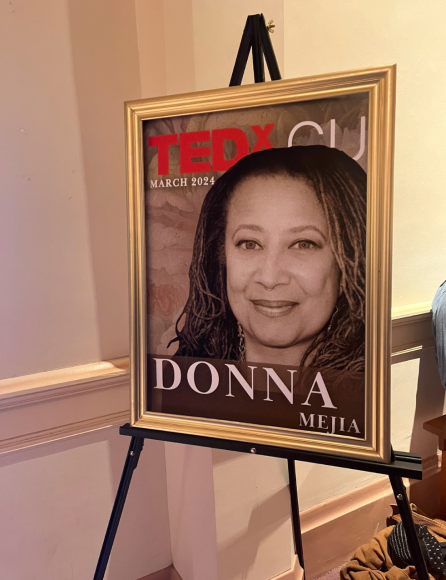
A poster of Donna Mejia is displayed at Macky Auditorium for TEDxCU on Mar. 2, 2024. (Greta Kerkhoff/ CU Independent)
“I wrote us a love letter. May I?” opened Donna Mejia in her speech at TEDxCU on March 2.
Mejia, an associate professor at the University of Colorado Boulder and the Inaugural Chancellor’s scholar of health and wellness for the Renée Crown Wellness Institute, was one of eight speakers in Macky Auditorium tasked with speaking to the theme of “Renaissance.”
Her speech at TEDxCU about multicultural understanding and empathy began as a letter to the community.
Mejia sat in a chair on stage, with her letter placed in front of her like a book. Beside her was a table with a plant and a candle. She looked at the audience and began to read.
“Dear friends, I’ve been a practitioner and educator in the arts, somatic sciences and critical theories about Earth’s cultures for over 30 years,” she began. “I’ve also been a multi-heritage human for over 50 years. From my vantage point, the resurgence of supremacy ideologies, misinformed culture wars and the reshaping of factual narratives isn’t new at all. And it continues to interfere with and dissuade some from exploring and understanding human culture.”
Mejia described how in her teaching, discussions of culture and cultural differences often caused students to hesitate for fear of embarrassment or retribution. To combat this anxiety in class discussion, Mejia created her own framework which she calls “fumble forward.”
“I developed a social practice for my classroom called ‘fumble forward’ to keep the space of inquiry open. During charged conversations and exchanges, students will preface their public commentary by saying ‘I’m about to fumble with my words.’ The class would answer as a chorus, ‘fumble forward,’” she said. “It became our social contract.”
The practice has taken on in other classrooms at CU Boulder as a means of inspiring open discussions around potentially controversial topics, as well as in the personal lives of Mejia’s students.
“My students would return from their school breaks to tell me how effective fumble forward was at a dysfunctional family dinner or in navigating conflict with roommates,” Mejia said.
Mejia described how this framework allowed students to “stay open and speak from the heart,” during hard conversations.
“I’ve marveled at how skillful our young learners are, and how eager they are to try,” she said.
Fumble forward is just the opening however, “The underlying work we implicitly agree to is an examination of our social programming,” Mejia said.
Olivia Bahr, a junior at CU Boulder and a member of the audience said, “I think the general concept of it being acceptable to say wrong things is a good philosophy in general. I think if you’re in a situation in which that’s not the case, that’s not good. It’s good that in those situations people have created systems like this.”
Mejia also touched on her own experience as someone with a multicultural background.
“I have experienced the insidiousness of white supremacy, the indefensible ridiculousness of gender subjugation, painful betrayals from my own black and brown peoples, due to our internalized colorism, the brutality of domestic violence and a sting of being told I’m not black enough, indigenous enough, European enough, smart enough, normal enough. Go ahead and fill in the blank.”
Mejia acknowledged that these power differentials are nothing new citing her own inner “Creole auntie” as someone who tempts her away from her own framework at times.
She concluded with this, “Fixing another may not be our obligation, but modeling patience and equanimity can plant seeds that may bear fruit in a future when another may finally [be] ready to fumble and heal too.”
Contact CU Independent Staff Writer Greta Kerkhoff at Greta.Kerkhoff@colorado.edu.
